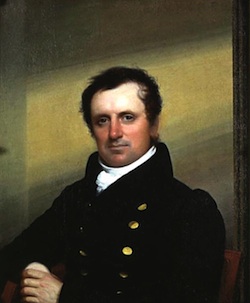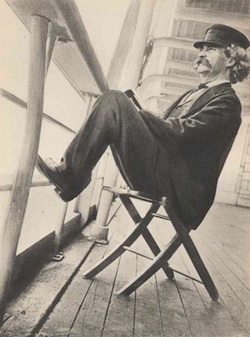Huck Finn and Tom Sawyer Among The Indians is Twain’s first attempt to directly parody one of the nineteenth century’s most popular American genres the Indian adventure story. The unfinished novel begins where every other sequel to The Adventures of Huckleberry Finn begins after the boys and Jim return to Missouri and Tom becomes restless.
Rather than amusing romps through popular contemporary genres, this unfinished Twain novel is an illustration of Tom’s bad habit of confusing genre fiction for reality and Huck’s generously indulging him to the point of no return. It’s also a kind of assualt on James Fenimore Cooper.
Citing popular books he’s read, Tom convinces Huck and Jim the Plains Indians are a noble, almost glamorous people (“Amongst the Injuns, life is just simply a circus,” he tells them) and insists they should go live among them. With their endless supply of treasure dividends (acquired in The Adventures Tom Sawyer from an “Injun” who clearly wasn’t part of the circus act), the boys procure horses and other supplies and set out west, leaving a polite note behind for their families.
Once on the plains they come upon a camped family and become acquainted. The Mills family is waiting for the fiancé of the oldest daughter to catch up with them, a man named Brace Johnson who they describe as being a regular Leatherstocking, knowing dozens of native languages, how to skin a buffalo while it’s still running, and all kinds of other nonsense. Near the Mills’ camp is the camp of five Indian men, who interact with the family and seem friendly enough (save one, who is in mourning), teaching everyone games and sharing food. However when Huck slips and exaggerates the number of High Plains Übermensch the Mills family is waiting for (he bumps the number from one to seven), the mood goes from picnic to panic and the five Indian men, expecting an approaching massacre, attack the camp, killing the Mills men and mother and kidnapping Jim and the two Mills daughters. Tom and Huck manage to escape, but return to the camp confused, horrified and heartbroken.
Determined to rescue Jim, the boys decide to stay near the camp (which is littered with bodies) and wait for Brace to arrive. When he does his reaction isn’t pleasant: the mourning Indian took the opportunity to avenge a dead friend, Brace explains, and he hopes his kidnapped fiancé has had the sense to kill herself. There’s still hope for Jim and the very young girl, however, so he agrees to accompany the boys to find them. The plains grow increasingly hostile as they move on (never managing to catch up to the Indian party) the trio faces and barely manages to overcome floods, fogs, and roaming bands of similarly hungry, exhausted, and aggravated characters. The book stops when Brace notices the party they’re trailing has more horses than before (Huck tells us, “He knowed it by signs but he didn’t say what the signs was.”).
“Indians” was started in 1884, the same year The Adventures of Huckleberry Finn was published in Britain, and it is more similar to it in tone than the two 1890’s genre parodies. It’s many years before Twain actually allows Tom to solve a murder mystery or make it safely across the globe in a balloon; in this text the boys are making fools of themselves in a real and gritty world and must pay very dire consequences for it, consequences that Twain either didn’t have the heart or focus to make them pay; Indians ends abruptly before things come to a head.
This grittiness and unpleasantness may be intentional. One of Twain’s more famous professional grievances was against James Fennimore Cooper, whose Leatherstocking Tales required too significant a suspension of Twain’s belief:
The personages of a tale shall confine themselves to possibilities and let miracles alone; or, if they venture a miracle, the author must so plausibly set it forth as to make it look possible and reasonable. But these rules are not respected in the “Deerslayer” tale.

One of Twain’s other complaints about Fennimore Cooper was that:
a tale should accomplish something and arrive somewhere. But the “Deerslayer” tale accomplishes nothing and arrives in air.
Clearly concerned that his own novel was accomplishing little and arriving somewhere atmospheric, Twain stopped writing it mid-sentence. However as an almost cautionary parody the unfinished novel actually accomplishes a great deal and is definitely worth reading.
Allegra Frazier is a writer, editor, and visual artist living in New York. She founded the Brooklyn-based literary magazine Soon Quarterly, and her work can be seen in The Brooklyner, in The Short Fiction Collective, Storychord, and elsewhere.











Given that Twain was trying to put his critique of Fenimore Cooper’s literary offenses into fictional form with Huck and Tom Among the Indians, it is a shame that we do not also have (however fragmentary) a manuscript for Huck and Tom Among the Bavarians to go along with his linguistic musings on “The Awful German Language”.
I took an Early American Lit course in college in which we read Cooper’s “Last of the Mohicans.” The professor ripped on it the whole time, which was hilarious. The book was indeed pretty awful.
Look at me, four years too late with this comment.
I think that anyone who looks at Twain’s story as a real critique misses the entire point and sees Twain too much as someone to critique rather than someone to enjoy. It is humor, the entire story. It is one of my favorite Twain shorts, along with The Lightning Rod Salesman and one about the ghost of the Cardiff Giant who was inconsolable when it learned that it was a fake. Humor, reader, humor. Don’t take it seriously.